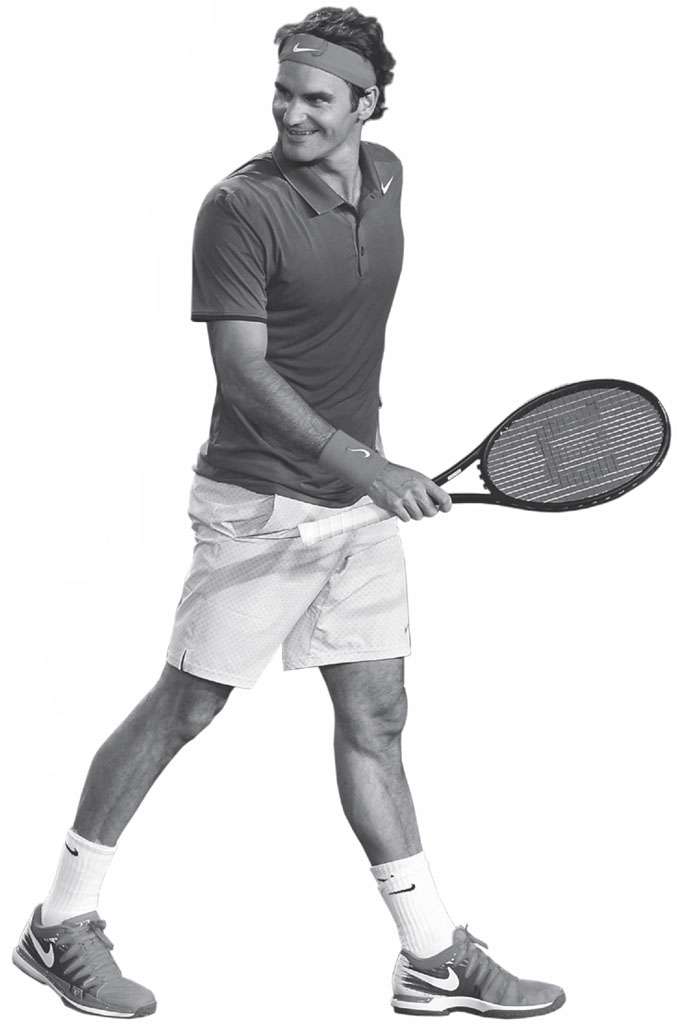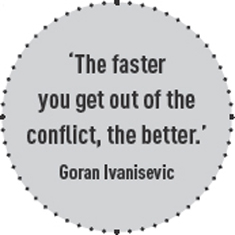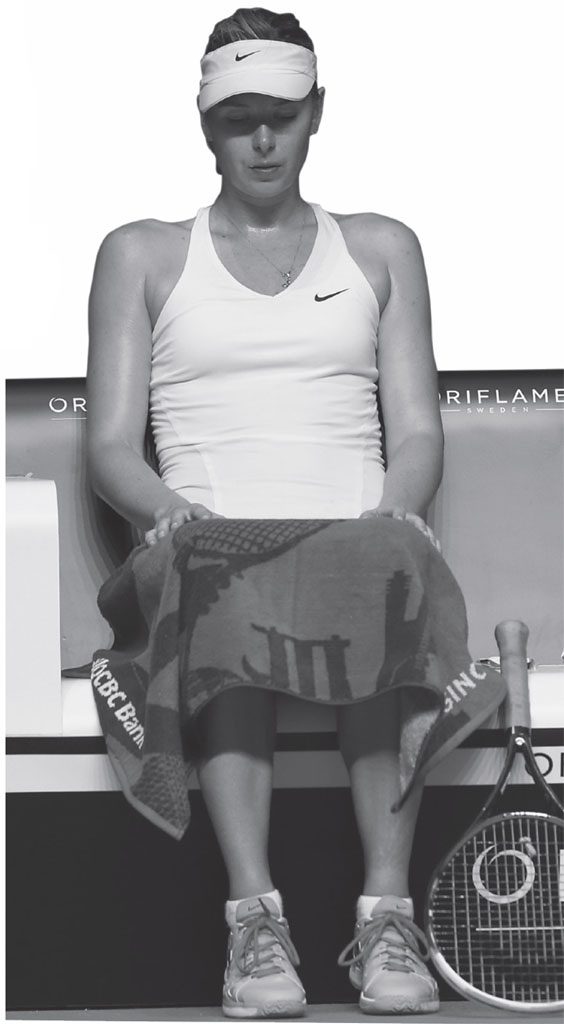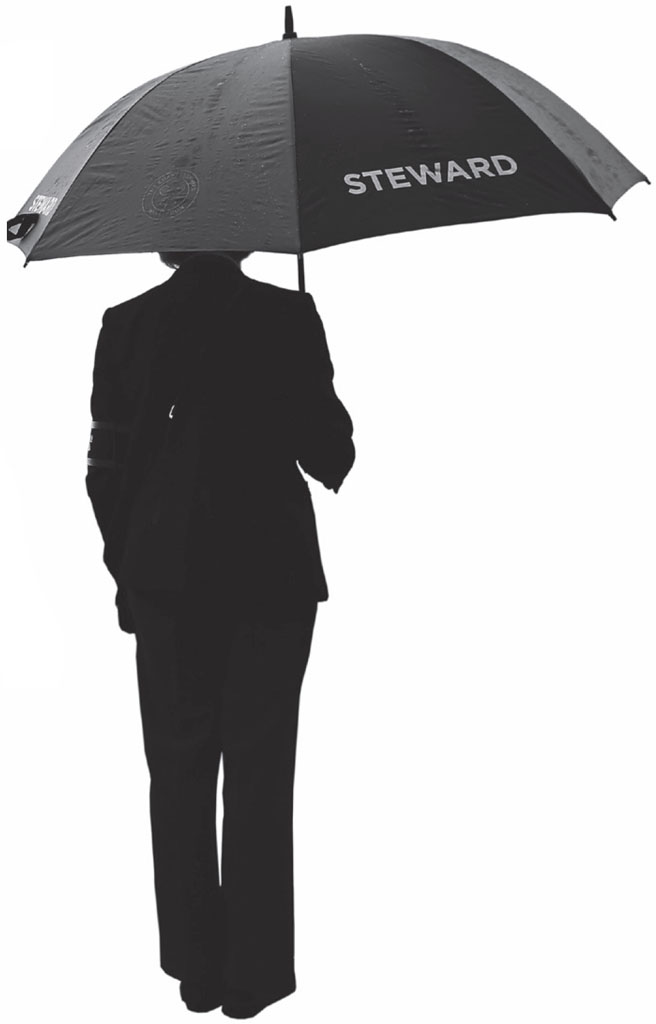
Jonny Marray, a Wimbledon doubles champion, on ‘HOW TO KEEP GOING DURING THE HARD TIMES’ …
The most important thing is that you believe in yourself and your game, and you think that you can have success as a tennis player: ‘So don’t let others knock the stuffing out of you. The only opinion that matters is yours. If you’ve got the belief, then you can be successful. I’ve had some hard times in my career when I’ve wondered whether I should stop playing, but I kept on playing because I felt as though I could achieve more on court.’
Recognise that it can be a long road to success. Patience is important. And so is perseverance: ‘Since winning Wimbledon, I’ve had cards and letters telling me that I’ve been an inspiration, as I’ve shown that perseverance pays off and you get your reward at the end.’
Have a clear goal: ‘There were times in my career when I was just floating through. You need a goal, and you also need a clear plan for how you’re going to achieve that goal. Every time you go on court, you will have a clear idea of what you need to do to improve. A tennis player needs direction if they’re going to be successful.’
You can’t do this on your own: ‘So surround yourself with good people who are going to encourage you when times are tough. They should know when it’s the right moment to have a word in your ear. It was especially tough for me when I was out with an injury, and so wasn’t earning anything for months, and you need that cash coming in to survive. Without my friends and family, it would have been difficult to have kept going.’

Andy Murray’s former coach Mark Petchey, on ‘HOW TO DEAL WITH AN OPPONENT’S CHEATING AND GAMESMANSHIP’ …
Cheating in junior tennis is rife. But you shouldn’t accuse someone of cheating after one bad line-call or even a couple: ‘Only after several bad line-calls, and obviously bad ones, and if you’re sure, should you say something.’
Sometimes, drastic action is needed: ‘Parents are loath to teach their children to do what an opponent is doing to them, but sometimes only drastic action works. You see people getting fed up with their opponent’s cheating and catching an opponent’s serve on a big point and calling “out” and there’s not very much that the opponent can do about it. That sends out the message to your opponent, “Are we going to play tennis or we going to play something else?” The reality is that, in junior tennis, you probably won’t have an umpire or a supervisor, and this is sometimes the only way to deal with it.’
In junior tennis, you will get players who slow everything down, who keep stopping to tie up their shoelaces, or who stall in other ways. Unfortunately, there’s not very much you can do about it: ‘In professional tennis, there are rules in place about not taking too much time between points. There is much more scope for gamesmanship in junior tennis.’
Dan Bloxham, head coach at the All England Club, on ‘HOW TO COPE WHEN PLAYING A CHEAT’ …
Know that your cheating opponent is scared and insecure: ‘A cheating opponent, someone who gives bad line-calls, is the curse of junior tennis. Unfortunately, a lot of kids are giving up because of cheating opponents. It’s certainly affecting the girls. It’s a big issue, a big problem. The girls get very disheartened. They see it as a personal attack. With the girls, it goes deeper, it upsets them, and they think, “What’s the point?” We tell our kids they have to be stronger than the cheats, those who can’t play without cheating over line-calls. We tell our kids that cheats never prosper. You can cheat your way for a certain amount of time, but you can’t cheat your way into the Davis Cup squad. Eventually, they will get found out.’
Don’t lose your cool. Put your hand up to alert the referee to the problem: ‘The referee will often ask the players to go back to the point they agree on. But obviously that’s not great if your opponent was cheating when you had a match point. The good cheats wait for the right time to call your good shots out. They wait for a tiebreak or a major point.’
If there’s no one around, you have to try to discuss this with your opponent: ‘You have to front up.’
Realise that the cheat won’t go home happy or satisfied, while you can: ‘Why do you play tennis? To be No. 1 in the world? Yes, that’s a dream. But, along the way, whichever bus stop you get off at, hopefully you’ve learnt to compete well, you’ve learnt to make friends, you’ve learnt to make good decisions, so really what we’re talking about are the values of life. If the other guy cheats, what sort of person will he be, how successful can you see him being, and how happy will he be? Even if he wins, he’s going to go home knowing that he’s done the wrong thing. You’ll go home happy, knowing that you’ve done the best you could, and that you’re a better person.’

Elena Baltacha, a former British No. 1, who passed away in 2014 at the age of 30 after losing a battle with liver cancer, on ‘HOW TO STAND UP FOR YOURSELF’ …
A top player will always want you to feed their ego. Always. So you can’t show them any respect. Don’t make eye contact: ‘Don’t make your opponent feel as though you respect them, as that’s what they want. They want to beat you purely because of who they are. So, whatever you do, don’t let them.’

Let them know you’re not going to roll over: ‘I remember a time I played Maria Sharapova in Memphis once. She started her mind games before the match – she didn’t give me a proper warm-up as she was just smacking the ball all over the place, or hitting the ball right at me,and not giving me any rhythm. It was bang, bang, bang. So I thought to myself, “Do you know what? I don’t care who you are. I’m not going to make any eye contact with you.” Once the match started, I got a good tempo going, and I was playing well, and so I started shouting “C’mon” in Russian. I was screaming it. I think she was surprised by that – she didn’t think that I could speak Russian – and she realised that I wasn’t giving her any respect. So she responded by saying a few things to me in Russian. She was cussing. She was basically saying to me, “Oh yeah, you can speak Russian, so I’m going to throw it back at you.” And I was loving that, as I’m one of those players who gets good energy from situations like that, as it makes me more competitive. It’s real gladiator stuff, one against one. That really gets me going. This carried on during the match, and she gave me a look when we shook hands at the end. She beat me, but what I loved was that she knew I wasn’t going to just roll over. Some players might be really intimidated, and think to themselves, “Oh, wow, Sharapova, she’s amazing.” I was never like that.’
Don’t allow an opponent to intimidate you with a shoulder-bump – and don’t always wait for them to cross first when you’re switching sides of the court: ‘I’ve never gone out of the way to start anything on court, but if anything does happen I will always stand up for myself. I’ve had a player deliberately bump my shoulder as we crossed at the net, so I turned and just said, “Whatever, nice one.” Some will take being shoulder-bumped, or always being forced to go second when crossing the net, and they will get deflated from it. They’ll be thinking, “Oh, OK, I know my place. I’m not as good as you, so I will wait my turn at the net.” They get intimidated. Other girls will think, “No, you’re not going to do that to me. I’m not going to wait. If we bump shoulders, we bump shoulders.”’
You have to accept that sometimes trash-talking goes on – don’t let it affect you: ‘Most of the time, if people are saying anything on a tennis court, they’re not insulting each other. It’s about shouting “C’mon” across the net in your opponent’s face.’
You have to be ready to deal with the occasional comment in the locker room or at lunch. Girls make comments to each other. They are small comments, but they are deliberate: ‘Do you think to yourself, “Oh well, it’s not worth it, I can’t be bothered with that, as that’s just pathetic,” or do you stand your ground? That doesn’t mean having a physical fight. But you can be hard headed and say something back to her. You won’t see fights in a women’s locker room – women aren’t like that – but you will hear occasional arguments and chat, chat, chat.’
Having an argument could help you to play better tennis: ‘Some people get so angry that they aren’t able to concentrate on their tennis. But if you think that you react better by just letting everything go, then maybe that’s what you should do. If you’re someone like me who thinks to themselves, “That’s not right,” then reacting to your opponent is going to help you get up for the match.’
One tactic that players sometimes use is to call the physio on, or to leave the court to go to the loo, or to go back to the locker room to change their clothes. Unfortunately there’s nothing that you can do about it: ‘It’s not as if the umpire can stop anyone from leaving the court to go to the loo. Gamesmanship happens at all levels of the game. It’s one on one, and there’s often a lot at stake.’

Annabel Croft, a former player and now TV and radio presenter, on ‘HOW TO DEAL WITH BITCHINESS IN TENNIS’ …
Don’t engage with anyone who makes nasty comments: ‘There were a few occasions when people said nasty things to me – quite abusive comments – but I always chose to ignore it and to rise above it. My theory has always been that you shouldn’t engage. I see people engaging with those who have abused them, I just think, “Why are you doing that? Why are you showing someone that you’ve taken notice and that you’ve nibbled?” If you engage it shows that you’ve been hooked. Other people decide to go head on, but I’ve always thought that it’s best not to do that. It’s probably down to personality. Obviously if you’re tired, you might deal with the situation a bit differently, but I can’t think of any situation in which I would choose to deal with it head on.’
One way of protecting yourself is not to form friendships: ‘Tennis is a highly competitive world, especially on the pro tour. There are a lot of egos on display. When you’re up against a rival, you’re like a couple of rutting deer. It’s impossible in that situation not to have clashes of personality in certain situations. It wasn’t until I came off the tour that I learned to view some of the other players as human beings. They were always enemies on the tour. You always viewed them as a potential opponent, as someone you would really want to beat. And you would get anxious about wanting to beat them. You don’t want to give much away. One of the reasons I quit the tour at 21 was because you didn’t have friendships on the tour. When you’re on the tour, it’s difficult to step back and look at the bigger picture.’

Monica Seles, a former world No. 1, on ‘HOW TO COPE WHEN THERE ARE COMPLAINTS ABOUT YOUR GRUNTING’ …
Whatever happens, be true to yourself: ‘All you can do as a tennis player when you go out there is to focus on yourself. You play opponents who bounce the ball 50 times before they serve, or take much longer between points than they should do, or who take injury time-outs. As long as you’re not grunting to upset an opponent, it’s OK.’
Realise that the better your results, and the higher you climb in the rankings, the more interest there will be in your grunting: ‘I never grunted on purpose. I grunted from the age of eight. I grunted when I was ranked 83 in the world. I grunted when I was No. 1 in the world. I know that I played my heart out. That was my style of play. I can only speak for myself. I gave everything on every ball. If you look back at footage of me, when I was 12 or 14, I was grunting against the same players. But when I became No. 1, then it became an issue.’

Pam Shriver, a former US Open finalist, on ‘HOW TO DEAL WITH AN OPPONENT WHO IS GRUNTING’ …
The number-one rule – and this is a pretty good life lesson – is not to let anyone upset you. Don’t let someone else’s behaviour or actions throw you off: ‘You have to focus on yourself, and not your opponent. It’s about self-care. You should be approaching every match with a clear mind. You’ll probably know beforehand whether your opponent is a grunter or not, and if you’re prepared for any noise that’s coming, that will make it easier to deal with.’
If the noise is really extreme, if you feel as though your opponent’s grunt is hindering you, and especially if you feel as though they are doing it deliberately to throw you off your game, you should appeal to them to stop: ‘But ask nicely. You’ll tend to get a better response if you try to appeal to their common courtesy. If that doesn’t work, speak to an official, if there’s one available. But there won’t always be an official for amateur matches, so you are probably going to have to appeal to your opponent.’
It’s important to appeal about the noise at the right time. Appeal just after you’ve won a game or even stop in the middle of a rally: ‘But don’t appeal just after you’ve lost a point as then it’s going to look as though you’re just upset about losing the point.’
Most people just play tennis for the exercise and the enjoyment, and if that’s the case with you, don’t organise a match against someone who you know will annoy you with their grunting: ‘Of course there are going to be times when you’re playing in a tournament or in a league, and you’ve got no choice, you’re stuck with the grunter. But if you do have a choice, don’t book the grunter.’

Chris Evert, a winner of 18 grand slam singles titles, on ‘HOW TO DEAL WITH NERVES’ …
Prepare before going on court: ‘I always had to be on my own for an hour before a match. I couldn’t socialise in the locker room. I used to listen to music, or lie down and visualise the matches, anything to get in the right frame of mind.’
Make the most of the warm-up: ‘It used to take me two or three games to get into my groove. I was known for being a slow starter. So during the warm-up, I made sure that I ran around as much as possible, and got a sweat going, as then I could start properly.’
It’s important to be aware of what nerves do to you physically, as then you know how to combat that: ‘Some people are paralysed by nerves. They start double-faulting, or their feet feel as though they are made of lead. If you have a problem with double-faults, hit second serves on your first serve, so at least you get the ball in. If your movement suffers when you’re nervous, try to stay on your toes at all times, and make exaggerated movements. Dealing with nerves came naturally to me – Martina Navratilova had the athletic genes, and I had the mental genes. I was able to stay calm.’

Stefan Edberg, a former world No. 1 who won six grand slam titles and is now coaching Roger Federer, on ‘HOW TO STAY CALM ON COURT’ …
Think positively – the great thing about tennis is that you can play lousy shots for an hour and still win the match: ‘Sometimes you have to accept that your opponent is going to do a better job than you at hitting the ball. You have to realise that there was nothing you could have done about it, and think, “OK, fine, now it’s my turn to hit a great shot.” It’s all about psychology. There are going to be frustrations on court, but think positively. Even if you play badly for an hour, you’re still in the match, remember that.’

Start to train the mind by taking a good approach to practice sessions, and that will carry over into matches: ‘Sometimes it takes time to change your approach. Look at Roger Federer, he used to be more emotional on court, and he taught himself to be calmer. As you get older, you realise that tennis is very complicated – there are so many elements that go into it – and the mind is very important. You have to train the mind.’
You can learn a lot from watching players who always stay calm on court: ‘I’m a naturally calm person. But when I was growing up in Sweden, we looked up to Bjorn Borg and saw how he behaved on the court, how he stayed calm and dealt with everything. You can’t be someone you’re not, so if you have a temper you’re still going to have that temper, and you have to let it all out. But you need to control yourself.’

Simona Halep, who played in the 2014 French Open final, on ‘HOW TO AVOID FEELING STRESSED ON COURT’ …
If you’re feeling too much stress on court, you need to learn to enjoy the game, and not just the results: ‘When you’re stressed you can’t move your body, or hit the ball. I’ve experienced that. But if you’re more relaxed on court, and you’re taking pleasure from your tennis, you’ll be able to play your best.’
It’s important not to be too frightened or defensive – be bold and play your shots: ‘I used to be frightened. So I was playing too defensively, and I was running a lot. I decided I would play more aggressively, and that I would make the points shorter.’

Marin Cilic, who won the 2012 Queen’s Club title after David Nalbandian was defaulted for injuring a line-judge, on ‘HOW TO COPE WHEN YOUR OPPONENT IS HAVING A TANTRUM’ …
Turn their negative energy into something positive – you should be encouraged by how they are behaving: ‘When you look over the net and see that your opponent is losing it, that he’s getting frustrated, and angry, and he’s throwing his racket, that’s a sign you’re doing something right.’
Keep on doing what you’re doing. Don’t let up: ‘As they say in boxing, your opponent is on the ropes. But you have to be consistent and persistent, so keep on playing the way you’ve been playing and hopefully you will go on to win the match. They could get fired up. You don’t want to let them back into the match. You want to push the guy off the cliff.’
While you should take notice of what your opponent is doing, you can’t allow yourself to be distracted: ‘Don’t let your mind wander. Concentrate on what you have to do. Focus on yourself. That’s not always easy, of course, and the situation at Queen’s Club with Nalbandian was very difficult for me.’
Goran Ivanisevic, a former Wimbledon champion, on ‘HOW TO DEAL WITH THE VOICES IN YOUR HEAD’ …
There’s always a little negativity in everybody’s head. You have to recognise that when you’re on court for hours it’s not going to be possible for everything to be beautiful and positive, all flowers and sunshine: ‘You’ll have some negative thoughts and some conflict in your head. I had a Good Goran and a Bad Goran. Bad Goran was influenced by the people around him, by the court, and he wanted to fight with everybody, and he wanted to leave the court. Good Goran said to Bad Goran, “Come on, it’s not over yet, let’s fight.” It was a little chit-chat in my head. It was between points, and then, sitting on my chair, between games.’
The voices in your head don’t have too much time to talk. You have to negotiate quickly: ‘The problem in tennis is that everything goes so quickly in your head, from good to bad, from bad to good. Whatever you do, you have to make a quick decision, and hopefully it will be a good decision. And hopefully whatever you’re thinking at that moment will be for the best. The faster you get out of that conflict, the better.’
Once you’ve reached a decision, stick with it: ‘Two minutes later, don’t start thinking, “Why did I make that decision?” That’s wrong. You make that decision in the moment, and you stick with it.’
You need an emergency voice for when the bad voice takes over too much: ‘You have to call 911, and you need the emergency voice to say to the bad voice, “come on, be good, let’s play.”’


Eugenie Bouchard, who reached her first grand slam semi-final at the 2014 Australian Open, on ‘HOW TO AVOID CHOKING’ …
Try to remember that playing tennis is supposed to be fun: ‘What works for me is putting things into perspective. I just think to myself, “I’m just playing a tennis match – it’s not life or death, or anything near that.” It’s just a game. If it’s a tough battle, then that’s fine, that’s why you play tennis. You enjoy that.’
Don’t think that you can control everything, as that will make you irritated: ‘Players choke because they really want to win, and they want to control their opponent and the conditions, and those are things you can’t control.’
Don’t become obsessed with winning; just take the match point by point, and don’t worry too much about the scoreboard: ‘It’s important not to think that you’re closing out a match. You’re just playing a point. So you’re just playing one point at a time. That way, I don’t worry about the score too much.’
The biggest mistake is thinking that you’re about to win, and looking ahead to the future and to your next match: ‘That’s absolutely the worst thing to do.’
If you do find yourself choking, take deep breaths: ‘You can tell you’re choking when you get tight and start hitting shorter, and you’re not hitting through the ball or playing nearly as well as you can. You’re not as loose as you could be. Breathing is very important. Try to relax.’
Learn from your battles: ‘With time and experience, it becomes easier to avoid choking. If you come through some tough, tight matches, that will give you the experience you need for the next time, as you can think to yourself, “I’ve been here and I can do this.”’

Annabel Croft, a former world No. 21, on ‘HOW TO USE THE CHANGEOVER’ …
Don’t burn energy by fidgeting all the way through the changeover: ‘Some players don’t stop moving. They’re picking up the racket on one side of the chair, then putting it down on the other, and then towelling themselves down, then rearranging their hat, then drinking some water, then fiddling with their racket again. Their eyes look this way and then that way. That’s because they’re looking back, and reflecting on what just happened, and then looking ahead and getting really distressed about everything.’

You have to learn how to forget. Anything that has happened previously should be in the past and forgotten: ‘And you need to – this is that great Billie Jean King line – stay in the moment. The top players are always trying to just focus on the next point, and not concern themselves with what has already happened.’
Chatting to the umpire is OK if you feel as though you want to rant and to get something off your chest: ‘I suppose some people need to do that, but you’re using up energy on something that has already happened. But if you don’t speak to the umpire at the change of ends, you might spend the next game stressing about it.’
Don’t sit there with a blank mind: ‘You don’t want to think too much, but you should be clear in your mind about your tactics and what you want to do in that next game.’

Martina Navratilova, arguably the greatest female tennis player of all time, on ‘HOW TO AVOID BURNOUT’ …
You should always be looking to improve, as that will keep you motivated: ‘I just loved the sport, and wanted to be the best tennis player that I could be. Great players always think they can do better.’
If you’re trying to play as little as possible, you’ve probably lost some of your love for the sport. And you need a break: ‘I played burnt-out tennis for a while in the 1980s, and I didn’t even know it. I should have known when I was making the schedule for the following year, and I said to my coach, “How few tournaments can I play and still stay at No. 1 in the world?” That should have been the clue that I was burnt out. Had I been a psychologist, or known what I know now, I would have said to myself, “OK, you’re burnt out – you need to take some time off and then come back fresh.”’
If you’re unsure, speak to a friend who also plays tennis: ‘In 1989, I started talking to Billie Jean King, and I said, “Billie, I don’t know what’s going on, I’m playing but I’m struggling,” and she said, “You’re just burnt out – do you still love the sport?” I said, “Well … ” She said, “You need to figure that out. You need to regain the love that you had when you were a little girl hitting against the wall. If you can’t feel that wonder or love, you should do something else.” I took a week off, didn’t do anything, and then I thought to myself, “I want to play.” I played for several more years, and I loved it. I didn’t take that much time off, just that one week when I did nothing. That was enough. I just needed to recharge my batteries and realise how much I loved the game. I had been playing for all the wrong reasons. I had lost sight of how much I love the game.’

Dan Bloxham, who is Master of Ceremonies for the Wimbledon Championships, and so responsible for getting the players on to Centre Court, on ‘HOW TO COPE WITH A RAIN DELAY’ …
You can’t control the rain so don’t bother trying: ‘If you’re a young player, look at the example of the top players, who just make good decisions. They come off the court, they sort themselves out, they have a shower, they do all the things they need to do. And they stay really calm. Just try to control the things that you can control. Just try to be relaxed. It’s tough when you have to warm up and get ready three or four times, maybe even more, to play a match. But again, that’s not something you can control.’
Try to establish with the referee how much time you have before you go back on court: ‘You need to know whether you’ve got the time to do the things you want to do.’
If it looks as though there’s going to be a long delay, don’t leave it too long before eating again: ‘You have to be sharp with what’s going on.’

Don’t spend the rain delay looking back at what has already happened in the match. Instead, you should be relaxing and thinking about what’s ahead of you: ‘The top players will be thinking about what they’re going to be doing when they go back out. They wouldn’t be reviewing how they are two sets up or how they are two sets down. If there’s an hour or two, they would be relaxing. And then about 15 to 20 minutes before the match, they would start to mentally prepare themselves. They would start their build-up again.’